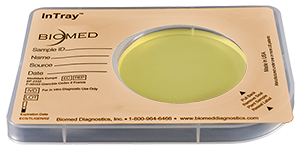Honoring Veterinary Dermatologists
Published on 09/23/2019
At Biomed Diagnostics, we encourage all our animal health clinicians to partner with your veterinary dermatologist — for confirmation and treatment consultation.
View other articles from this Cultured Connections
Veterinary dermatologists are extremely qualified in recognizing and treating numerous skin diseases including infectious (bacterial, fungal, viral), parasitic, congenital and autoimmune — as well as dander-related skin disorders. Identifying patterns of skin lesions/sores often aids in their efforts of selecting proper diagnostic and treatment procedures — which may include the use of cyrosurgery, varying biopsy techniques and video otoscopy (use of a camera to examine the ear canals).
The training and experience of veterinary dermatologists includes:
- Skin cytology
- Skin scrapings
- Skin/ear cultures
- Skin testing
- and skin biopsy
Most veterinary dermatologists understand the critical need to stay abreast of improvements in the identification, diagnosis, prognosis, and therapy of recognized and newly recognized skin diseases. Most are apart of the American College of Veterinary Dermatology (ACVD), a group of Board Certified Veterinary Dermatologists who have expertise and specialized training in the diagnosis and treatment of animals with benign and malignant disorders of the skin, hair, ears and nails.
Click here to learn more about AVCD ►
Current Challenges in Veterinary Dermatology
Read a compelling report publish current challenges of providing a state-of-the-art diagnostic veterinary microbiology service including the identification (ID) and antimicrobial susceptibility testing (AST) of key pathogens in veterinary dermatology.
ESCMID Study Group for Veterinary Microbiology; Luca Guardabassi ►
WAVD Scholarships for WCVD9 are Now Open. Scholarship Applications Close December 1
The WAVD is very excited to announce that the scholarship program for WCVD9 is now open. WAVD offers financial support to encourage veterinarians with limited access to continuing education in veterinary dermatology to attend the World Congress.
Streamline your fungal diagnostics!

Biomed's line of InTray FungID is designed specifically for specimen transport, culture growth and observation in one device. Inoculating two InTrays, one for presumptive identification in your office, and one for transport to the veterinary dermatology lab — particularly if chronic or pathogenic fungal infection is suspected, allows you quicker and simpler confirmation and treatment results.
Published in the following categories: Companion Animal Dermatophytes Education NGO / Humanitarian Veterinary